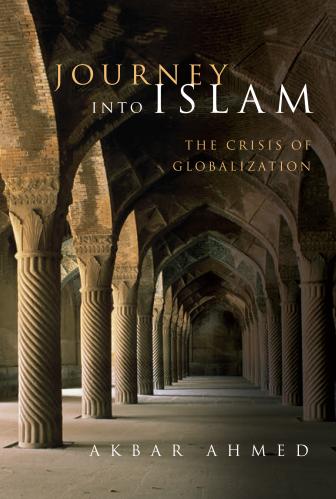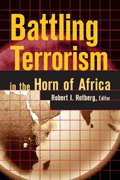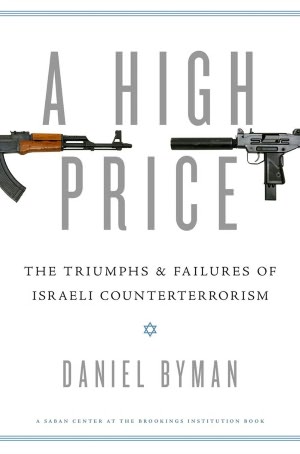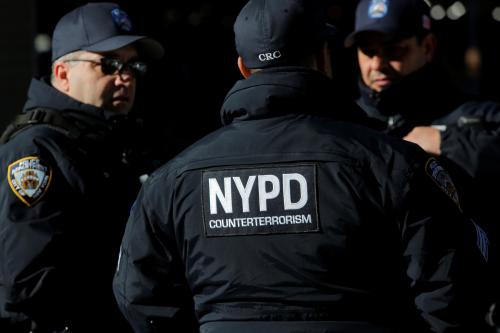Let’s be clear: America isn’t only facing random gun violence. FBI Director Christopher Wray recently said that “a majority of the domestic terrorism cases that we’ve investigated are motivated by some version of what you might call white supremacist violence.” The white-nationalist domestic terror attacks perpetrated from Pittsburg to El Paso—as well as the fact that there are now more guns loose in America than people—must serve as a wake-up call. Although the body count is smaller than 9/11, a domestic “war on terror” is urgently needed.
After 9/11
I spent the decade after 9/11 working hard to mitigate the risk of another terror attack. I didn’t enroll in the military like presidential candidate Mayor Pete Buttigieg or presidential grandson George P. Bush— both of whom quickly condemned the El Paso attacks as terror. But as an American who had spent most of my life in the U.S. but a chunk in the Middle East, I began writing, advocating, and touring both the U.S. and the Middle East to speak about what I thought were the smart U.S. public policies that would enable the U.S. to win the war on terror by winning what many were calling the “war of ideas.”
I teamed up with national security specialists to advocate for changing the way President George W. Bush spoke about the conflict. I advocated for changes like establishing America Centers across the Middle East (like we did in Germany after World War II, bolstering cultural exchange programs) and focusing our foreign assistance on the most susceptible countries. And in particular, I called for bringing together the whole of the federal bureaucracy to focus on this effort.
I worked with a World Bank-incubated U.S. non-profit organization to expand it to the Arab World, linking together high school students around the world to work on common projects and build common understanding rather than anger and suspicion. And I worked with Brookings to open its first-ever branch in the Arab world, where I served as its founding director. When Barack Obama ran for president in 2008, I volunteered—not only as one of his foreign policy wonks, but also as his chief surrogate to the American Muslim community.
After the 2008 election, I worked with officials at the Department of Homeland Security to reflect on how we could better counter violent extremism both at home and abroad. I took a role administering U.S. foreign assistance to the Middle East and working on the Israeli-Palestinian conflict. Throughout, I was motivated in large part by my desire to keep America safe. I sought to ensure that the United States was both doing good in the Middle East for its own sake, and was seen as doing good by those vulnerable to terrorist recruiters.
America’s domestic terrorism plague
After mass shootings in Charleston, Pittsburgh, El Paso, and numerous other cities across the country, America must confront the reality we face a plague of domestic terrorism at home. We must also confront the reality that that terrorism often has a white-nationalist, anti-immigrant, anti-Semitic, and anti-Muslim bent. And we must confront the reality that a slice of young white men are being radicalized by purveyors of hate, and that many have access to weapons of war. As a result, we in America do not enjoy even a fraction of the safety most of our economic peer nations around the world enjoy.
We can and must apply some of the lessons from the post-9/11 period to our domestic terror problem.
First, the hate. Just as the United States has rightly campaigned against Arabic media outlets that spewed anti-Americanism that in turn inspired terror, so too can our domestic war on terror seek to limit the impact of media outlets that spew racist and anti-immigrant sentiments. We spent billions overseas on public diplomacy to safeguard American lives and can undertake a similar effort at home; we need a more concerted effort to reach into hate-filled environments to diffuse extremist narratives. And while we need to be careful about freedom of speech, no one has an inherent and absolute right to use major public forums to purvey hate.
Also, just as we worked to identify vulnerable populations overseas and targeted development assistance to areas with large numbers of youth who were susceptible to extremism, we can and should take similar a approach to countering domestic terror. This would mean determining which communities have been the most susceptible to extremist ideologies and have suffered economic setbacks, and investing accordingly in job training, community infrastructure, and engagement to identify and counter extremist narratives. We should also recognize that to do so effectively, we may need to significantly increase the investment dollars available for these communities.
Like with international terrorism, a cross-government effort is needed so we can work together to identify the individuals who are most at risk of perpetuating attacks. Federal and local officials—both law enforcement and social services—need to make sure both that they don’t have access to weapons and that they do have access to help to get their lives back on track.
Second, the guns. You don’t need a Ph.D. to know that weapons of war should be illegal to own and that every gun owner should be required to pass a background check. Every other advanced country has a policy on guns that makes them far, far safer than we are. We can make progress on this issue. We restrict guns from airports and airplanes, and that is why the safest place to be in America is on a commercial flight, where we have had only one accidental death in a decade.
Finally, political leaders need to take responsibility for setting the tone of the nation. When crowds break into ugly chants like “send her back,” our leaders—all of them—must respond with: “We are all one.” In 2004, the Pentagon said that “nothing shapes U.S. policies and global perceptions…more than the President’s statements.” It is even more true in the domestic terror environment today.
The terrorism problem we face today is a daunting one, and there are no simple solutions. But we’ve waged similar battles before, and can learn important lessons from earlier successes and failures. Ideally to succeed, we need our president to bring the whole of the federal government together with local officials in a single national effort focused on both the domestic war on terror and a domestic war of ideas.
At the same time, just as those Americans who intimately understood the Middle East rose to the post-9/11 challenge, those who have ties to communities where domestic extremism is growing can and should rise up to play a role.
If we don’t, we will lose countless hundreds if not thousands of Americans to domestic terrorism in the decades to come. And we will have failed our values, particularly the one that should be at the center of our domestic war of ideas: E pluribus unum—out of many, one.
The Brookings Institution is committed to quality, independence, and impact.
We are supported by a diverse array of funders. In line with our values and policies, each Brookings publication represents the sole views of its author(s).










Commentary
What the post-9/11 war on terror can teach us about responding to domestic terrorism today
August 6, 2019